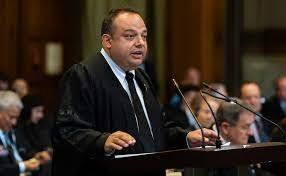South Africa accused Israel for committing genocide
In a riveting development at the International Court of Justice (ICJ), South Africa has leveled accusations of genocide against Israel concerning its military actions in Gaza. The case asserts that Israel’s conduct constitutes genocidal acts, thrusting the legal dispute into the spotlight at the United Nations’ highest court. This unprecedented confrontation marks a pivotal moment in international relations, intensifying scrutiny on the longstanding Israeli-Palestinian conflict. The ICJ now stands as the arena where the gravest allegations are debated, holding implications that could reshape diplomatic dynamics and influence global perspectives on the complex and contentious Middle East issue.
The Allegations
 South Africa asserts that Israel, in its conflict with Gaza’s ruling group, Hamas, violates the 1948 Genocide Convention, a treaty both nations ratified. The convention mandates preventing genocide, and South Africa alleges Israel deliberately causes the destruction of a substantial part of the Palestinian national, racial, and ethnic group. This accusation intensifies tensions over the Israeli-Palestinian conflict, raising questions about compliance with international law and the humanitarian impact of military actions in the region.
South Africa asserts that Israel, in its conflict with Gaza’s ruling group, Hamas, violates the 1948 Genocide Convention, a treaty both nations ratified. The convention mandates preventing genocide, and South Africa alleges Israel deliberately causes the destruction of a substantial part of the Palestinian national, racial, and ethnic group. This accusation intensifies tensions over the Israeli-Palestinian conflict, raising questions about compliance with international law and the humanitarian impact of military actions in the region.
Israel’s Defense
 Responding to the accusations, Israeli lawyer Tal Becker delivered a robust defense, claiming that South Africa has distorted the truth and presented a “sweeping counter-factual description” of the Israel-Palestinian conflict. Becker accused South Africa of providing a deliberately curated and manipulative account of the current hostilities, attempting to “weaponize the term genocide” against Israel.
Responding to the accusations, Israeli lawyer Tal Becker delivered a robust defense, claiming that South Africa has distorted the truth and presented a “sweeping counter-factual description” of the Israel-Palestinian conflict. Becker accused South Africa of providing a deliberately curated and manipulative account of the current hostilities, attempting to “weaponize the term genocide” against Israel.
Becker argued that while civilian suffering is tragic, Hamas, Gaza’s ruling group, seeks to maximize harm to both Israelis and Palestinians, while Israel endeavors to minimize it. Israel asserts its inherent right to defend itself and opposes South Africa’s attempt to halt its military operation against Hamas through an ICJ order.
Legal Proceedings
 The ICJ, being the United Nations’ highest court, is now tasked with examining the evidence presented by both parties. The court’s 17 judges are deliberating over the allegations and defenses put forth. The gravity of the accusations and the potential consequences make this case a focal point for international legal scrutiny.
The ICJ, being the United Nations’ highest court, is now tasked with examining the evidence presented by both parties. The court’s 17 judges are deliberating over the allegations and defenses put forth. The gravity of the accusations and the potential consequences make this case a focal point for international legal scrutiny.
Outside the courtroom, emotions run high, with symbolic gestures and demonstrations reflecting the deep divisions on this contentious issue. Palestinian flags wave beneath screens streaming live feeds from the courtroom, while banners draw parallels between the situation in Gaza and South Africa’s apartheid era. On the opposing side, a symbolic Sabbath table is laid, highlighting Israelis held hostage by Hamas.
International Reactions
The case has garnered international attention, prompting responses from various governments. Germany, in particular, issued a statement rejecting the accusation of genocide against Israel, emphasizing its commitment to the Convention against Genocide and denouncing the political instrumentalization of the claim. The UK government, represented by Prime Minister Rishi Sunak, labeled South Africa’s case as “completely unjustified and wrong,” standing firmly by Israel’s right to defend itself within the framework of international law.
Implications and Outlook
The ICJ’s ruling on the genocide allegations will be only an opinion, theoretically legally binding but not enforceable. The court could take years to deliver a final verdict, although it might rule more quickly on South Africa’s request for Israel to suspend its military campaign.
The outcome of this case has broader implications for the ongoing Israel-Palestinian conflict, international law, and the role of the ICJ in addressing complex geopolitical disputes. As the legal battle unfolds, it underscores the challenges in seeking justice for victims and determining responsibility in conflicts marked by deep-rooted historical and political complexities.
In the meantime, the eyes of the international community remain fixed on the ICJ, awaiting its opinion on the allegations of genocide against Israel, a decision that could shape the trajectory of future leg










